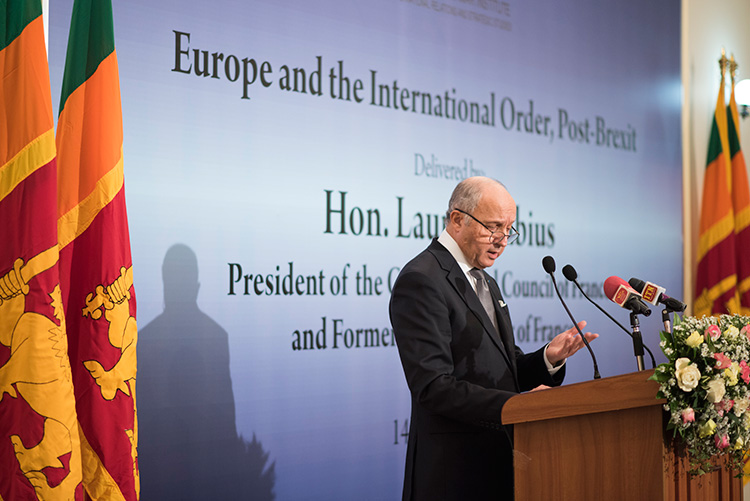Takeaways – Hon. Laurent Fabius on Post-Brexit Europe and the International Order
March 18, 2017 Reading Time: 3 minutes

Reading Time: 3 min read
Introduction
The Hon. Laurent Fabius, President of the Constitutional Council of France and former Prime Minister of France delivered a lecture at the Lakshman Kadirgamar Institute on 14 February 2017 on Europe and the International Order, Post-Brexit. The Hon. Mangala Samaraweera, Minister of Foreign Affairs of Sri Lanka and Chairman of LKI made the introductory address.
Key Takeaways
- The Hon. Laurent Fabius observed the growing ‘Euroscepticism’ in Europe, and how this has led to mistrust in the European Union (EU)’s capacity to take concrete action.
- Mr. Fabius stated that, in his view, Brexit is a ‘lose-lose’ situation for both the UK and Europe, resulting in three types of uncertainties and possible divisions.
- First, Brexit begins a period of uncertainty as to how a state formally exits the EU, including its rules on customs, border control, residency, and rights. This uncertainty is particularly damaging for the economic sector.
- Second, Brexit could also jeopardise unity within the UK. Scotland and Northern Ireland voted to remain as part of the EU, while the UK as a whole voted for Brexit. Scotland may push for another referendum to stay within the EU.
- Third, there may be changes to the international order, as the UK could modify its position towards NATO and the UN Security Council, and will probably strengthen its ties to the U.S. The EU’s relative weight in the G8 and G20 may be weakened without the UK.
- With regard to Europe in particular, Mr. Fabius presented three possible post-Brexit scenarios:
- A ‘soft Brexit’ – where the UK could leave the single market without cutting its access to the European Market; similar to the position of Norway and Switzerland.
- A ‘hard Brexit’ – where the UK would totally break from the EU’s system of law and adopt new national legislation to fill in the gaps.
- An ‘uncertain Brexit’ – where the absence of the UK would lead to the remaining 27 European member states going in different and contradictory directions.
- Mr. Fabius also elaborated on the scheme of an ‘Europe of Three Circles’, to build a coherent union of 27 countries. The scheme would establish a differentiated Europe which would allow the most willing countries to advance together at the same pace, without obstacles from countries that are not ready for greater integration. The ‘Europe of Three Circles’ scheme would involve:
- A ‘First Circle’ – uniting countries that are willing to forge deep economic and social integration. This smaller group of countries would manage their economies together and develop the institutional, financial, and legal mechanisms needed for close integration.
- A ‘Second Circle’ – comprising all 27 member states of the EU; some of whom could gradually integrate into the First Circle, at their own pace.
- A ‘Third Circle’ – which would be open to countries that are geographically close to the Europe but are not members of EU, such as Turkey.
- Mr. Fabius highlighted that the architecture of this scheme would be advantageous in bridging the need to uphold the values of Europe, on the one hand, and the growing sense of Euroscepticism, on the other.
- Mr. Fabius observed that Europe continues to be a leading economic partner of Sri Lanka, absorbing nearly one third of Sri Lanka’s exports and providing a major source of financing for Sri Lanka’s infrastructure. He also stated that Europe is devising a plan to allocate more than 250 million Euros for new projects in Sri Lanka by the year 2020.
- He noted that the EU lifted its embargo on Sri Lanka’s fisheries products last year, and that the European Commission this year recommended the renewal of GSP+, stating that there is “every reason to believe” that the recommendation will be adopted.
Click here to listen Hon. Fabius’ lecture.
Click here to read the transcript of the lecture.
